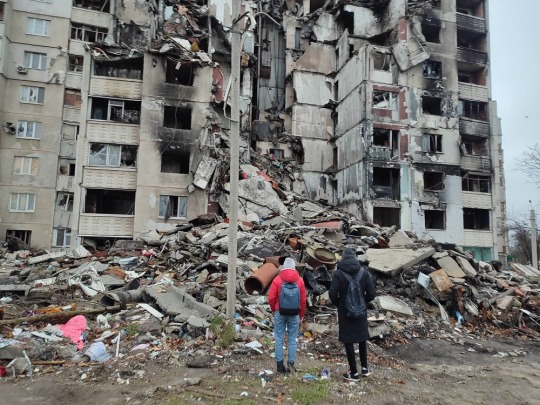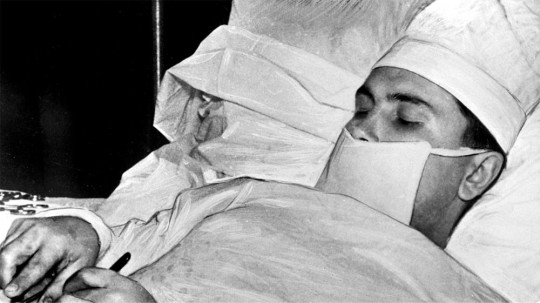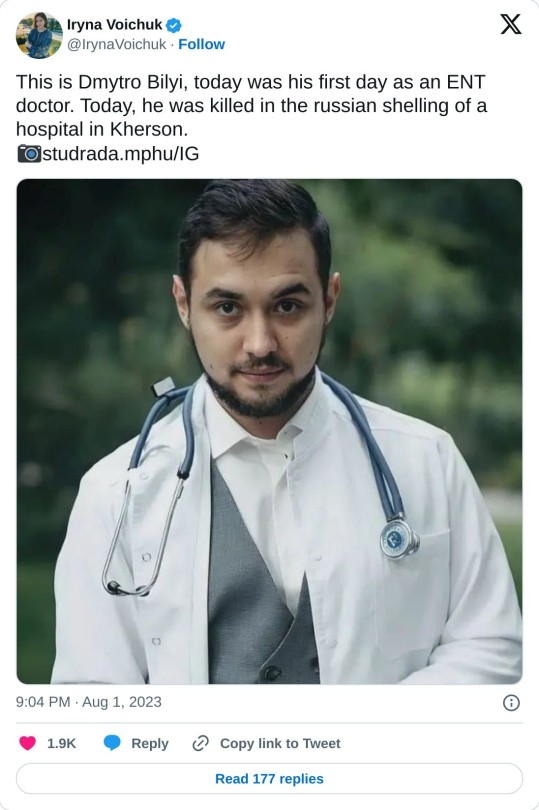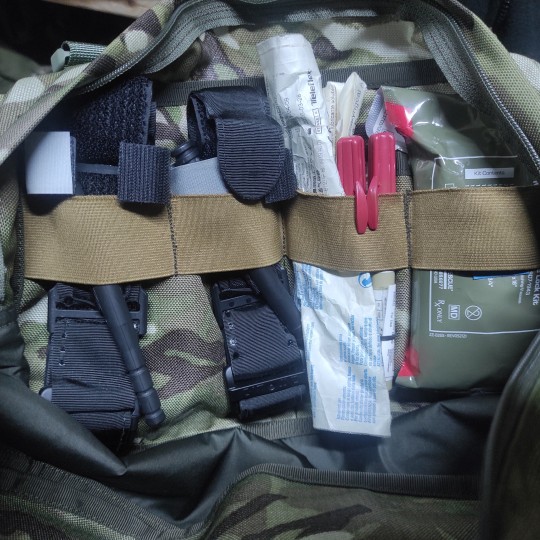#medicine in Russia
Explore tagged Tumblr posts
Text
If you, just like me, grew up labelled as a "good kid", it can be hard to finally go against what is forced upon you by someone's authority.
Especially when it comes to doctors and medication.
I've always been a good kid. I did everything doctors told me. I dieted, I kept taking more and more medication, I never spoke over them or against them, because they know best. Doctors are respectable, they are trying to help. My mom is a doctor. I got back some very shady-looking bloodwork as an adult and never questioned it, just assuming that I had somehow missed having been sick with hepatitis C at some point. The bloodwork turned out to be botched, and I had to go to another town to get it re-taken, showing that I have never, in fact, had hepatitis C. It is likely still a part of my medical records somewhere, though.
I am currently seeing a lot of doctors, as I finally have insurance and can get help for the smaller issues I've been having throughout the years. And yeah, it's kind of a mess. I keep being sent to different doctors from the same field, and they don't communicate with each other. They misread my papers, have trouble accessing my test results and scheduling follow-up sessions, they can be rude and dismissive sometimes, but overall, I'm doing fine, and I'm following their recommendations to a T. And they help, even if actually being listened to might have helped a bit more.
But sometimes, they'll send you to a psychiatrist to rule out some of your symptoms maybe being psychosomatic (because, you see, the only results of yours they could access were your most recent, good results, not the abysmally bad results you had at the beginning of the month, so now your abysmally bad results didn't sound real enough to them to still be causing any lasting issues), and the psychiatrist will be one of those types. The "autism is a terrible disease, but you can be cured!" type. The "you are sick in the head and must be immediately hospitalized, even though mental institution patients in Russia permanently lose some of their human rights" type, the "going into remission for your autism can cure everything, including your actual infections, and don't you dare not want to get rid of your terrible mental disease!" type. And, after pushing you, intimidating you, constantly switching the narrative and lying about what type of medication you are being prescribed, after refusing to elaborate about the side effects and essentially shooing you out while insisting you come back next time fully medicated (despite the next time not being covered by the insurance, and even the first time getting the psychiatrist up in arms about whether or not your insurance really covers it), the psychiatrist leaves you with a list of medications, after you have already extensively told them all about the horrible, life-threatening side effects you've had with similar types of medications before. You look these up online, and the side effects sounds like exactly the type of thing you want to avoid. Your mental health is not as bad right now as it used to be, your main problems are physiological, and it's not the right time to go and risk experiencing such a vast array of side effects that you were never able to escape with these types of meds.
But you want to be a good kid. A medical professional prescribed you medication and insisted that you take them. They also insisted on you coming back and checking in with them, about raising the "baby dosages" that had been prescribed. You are a good kid, good kids do what authorities tell them to! They take the medication and suffer the consequences, because the doctor knows best.
This is where you stop being a good kid and become a reasonable adult who doesn't want to risk fucking dying because they are dealing with some of the most incompetent medical professionals known to man.
I am still as pro-therapy and pro-medication as I was before, but I will keep on looking for a professional who doesn't make me want to write an official complaint about them three minutes in. They must truly believe that mentally ill and developmentally disabled people are incapable of defending themselves and exercising their rights.
Welp, gotta prove them wrong.
#ranting#mental health#autism#ableism#tw ableism#tw medical malpractice#tw medical abuse#medical malpractice#medical abuse#medicine in Russia#being autistic in Russia is living life in lunatic extra phantasm mode#I am also queer and anti-Putin to boot lol#no rest for the wicked#actually autistic#actually anxiety#I am using this as fanfic fuel btw#I ain't mad or anything#just tired of the malpractice and wish I can find a reasonable professional soon
9 notes
·
View notes
Text
If you want to support Ukrainians, DO NOT donate to Red Cross. Can't speak about their work in other countries, but they're useless in Ukraine. The only trustworthy international organisation I can think of is World Central Kitchen.
Donate to World Central Kitchen

And it's even better to donate directly to Ukrainian organisations. Here are a few good legit places:
hospitallers.life - "Hospitallers", Ukrainian paramedics on the frontlines
savelife.in.ua - "Come Back Alive", assistance to the army
prytulafoundation.org - "Prytula Foundation", assistance to the army, humanitarian causes
starenki.com.ua - "Starenki", helping elderly people
everybodycan.com.ua - "Everybody Can", helping disabled children, elders and hospitals
uanimals.org - "UAnimals", saving animals

#Ukraine#wck#world central kitchen#donation#charity#red cross#russia#russia is a terrorist state#genocide#stand with ukraine#support ukraine#genocide of ukrainians#russian war crimes#war#support#help#link#words#typography#text#txt#donate#children#elderly care#animals#army#medicine#food#disability#fundraising
6K notes
·
View notes
Text







Небесно-голубые цветы цикория (лат. Cichórium). Сентябрь 24. Sky blue flowers of chicory (lat. Cichórium). September 24.
#русский tumblr#Россия#осень#природа#лес#цветы#лекарственное растение#Цикорий обыкновенный#травы#мои фото#Russia#autumn#nature#forest#nature photography#flowers#herbs#medicinal plant#chicory#beauty of nature#flower photography#bloomcore#my photos#original photography#photographers on tumblr
348 notes
·
View notes
Text
📌"This is not just a war crime. This is beyond the bounds of humanity", - the director of "Okhmatdyt" Volodymyr Zhovnir spoke at the UN Security Council
📌 "At the time of the attack, more than 600 patients and almost as many employees were in the hospital. Three complex operations were being performed. The children were on drips, on dialysis, in intensive care. What happened put their lives at risk."
📌"The Russian missile hit the intensive care and chronic intoxication department. Part of the building was completely destroyed. The ceilings collapsed. We heard people screaming, asking for help."
📌 "Patients will not receive proper care. Our specialized services with high-quality equipment will not be available in the near future. We will have serious long-term implications for the medical field in terms of treating children."
📌 "This is not just a war crime. It is beyond humanity. Our doctors tried to save the children's lives until the last moment under the attacks and after everything was destroyed, not even heeding the sirens."

#ukraine#children#hospital#cancer#russia#russian invasion of ukraine#russian culture#genocide#terrorism#imperialism#colonialism#war crimes#missile#murder#russia is a terrorist state#україна#укртумбочка#укртумба#укртамблер#medicine#medical#europe#america#us#usa#germany
93 notes
·
View notes
Text

#healthy#health and wellness#healthcare#healthylifestyle#medicare#medicine#medication#green deal#budget#debt#kamala harris#joe biden#biden administration#biden#democrat party#democrats#democratic party#donald j. trump#president trump#trump 2024#donald trump#trump#fuck trump#maga cult#aoc#bernie sanders#ukraine#ukrainian#russian#russia
39 notes
·
View notes
Text
On the night of April 29-30, 1961, a member of the 6th Soviet Antarctic Expedition, the 27-year-old doctor Leonid Rogozov, successfully performed an appendectomy on himself in the Antarctic Novolazarevskaya station - a surgery to remove an inflamed appendix.

#Antarctica#Station#soviet#ussr#russia#bwphotography#russian#film#medicine#operation#surgery#appendix
108 notes
·
View notes
Text
Why do the years 2020 and 2019 seem so long ago? Whenever someone mentions “yeah 2019 I did-“ oh you mean during the depression? the invisible plague that wreaked havoc across the globe? do you still feel 17? 12? 18? 26? Your’e older know, not just physically, mentally you’ve aged fifty years. 2019 wasn’t five years ago, it was a lifetime ago, it was another world ago, another you. I mourn each time you mention it.
#love#fashion#truth#quote#mental health#poem#poetry#books#friends#muslim#2019#prepandemic#pandemic#COVID-19#danbilzerian#sneako#Russia#trump#Kamala Harris#2020#2020vision#vine#TikTok#postpandemic#medicine#study#tumblr#tumblr staff#supernatural#Wednesday
21 notes
·
View notes
Text

#stop russian aggression#support ukraine#genocide of ukrainians#russia is a terrorist state#medicine
144 notes
·
View notes
Text
Yesterday, one of my students asked me whether herbs are popular in Russia. Here is my post about it - with the list of some very common herbs.

17 notes
·
View notes
Text
I just watched the last episode of the Fellow Travellers.
I'm dead. Thank you.

#fellow travelers#OH MY FUCKING GOD 😭😭😭😭😭😭#now this is my favorite series#BUT IT HURTS SO MUCH#WELL. I EAT GLASS AND DON'T REGRET#I also see parallels with what is happening in russia#we have huge problems with aids treatment#our people don't have enough medicines#and I remember news about how buses with free hiv testing and free contraception were attacked by all kinds of scum#do you know why? simply because these buses were from lgbt activists#and all these raids that are now happening in our gay clubs because the new homophobic law#am I really living in the 21st century?
27 notes
·
View notes
Text
chiro
#alternative medicine#healthcare#chiropractor#massage#russia#medicine#healing#treatment#Manual therapist#chiro#chiropractic
5 notes
·
View notes
Text

Плакат направленный на пропаганду борьбы с ВИЧ-инфекцией, СССР, 1988 г.
A poster aimed at promoting the fight against HIV infection, USSR, 1988. The inscription on the poster "Let's say no to AIDS!"
5 notes
·
View notes
Text
Larrey about the Russian campaign and the effects of the cold
A book with letters from the Russian campaign 1812, citing and commenting on one by Larrey to his wife, has brought me back to Larrey’s memoirs. The passage below, as far as I can tell, demonstrates very well how medical knowledge of the time was still deeply stuck in medieval ideas and views and how hard it must have been for doctors to overcome that and to even question what had been assumed to be true for, like, ever.
Larrey in this passage from volume 4 of his memoirs briefly summarizes the effects the cold – in his opinion! - had on different soldiers, in particular on soldiers from different regions, and the supposed causes for that:
I noticed that dark-haired subjects with a bilioso-sanguine temperament, almost all from the southern regions of Europe, were more resistant than blond-haired subjects with a phlegmatic temperament, almost all from northern countries, to the effects of these rigorous cold temperatures, which is contrary to the generally accepted opinion.
Well, I can imagine that the generally accepted opinion indeed was different, because if blonds really were more susceptible to cold, Scandinavia and Russia should have been depopulated. But let’s hear him out:
The blood circulation of the former [i.e., the dark-haired type] is undoubtedly more active; the vital forces have more energy; it is also probable that their blood preserves much better, even under the influence of the most intense cold, the essence of animal heat identified with its coloration. By the same cause, their moral strength is more robust; their courage does not desert them; and, through a well-understood care for their own preservation, they are better able to avoid hazards than the generally apathetic inhabitants of cold and damp climates.
Larrey’s arguments here seem to come straight from medieval humoralism (humoral theory, or, in German, Vier-Säfte-Lehre, "Four-juices-theory" 😁). I understand the idea goes back to Hippocrates, was put into its final form by Galen in the second century and stood as written in stone until first doubts started to arise in the 17th century. But even then there only were slight changes and adaptions until it was finally openly called bullshit in the mid-19th century, with the discovery of cells and germs. Larrey in any case still seems to be firmly stuck in it.
Most people will have heard of this in one way or another as it’s still making its round in several esoteric systems. The general idea is: There are four different body fluids that determine the state of a human body’s health, connected to four colours and four human temperaments.
Blood – red – sanguine temper – hot/wet
Yellow bile – yellow – choleric temper - hot/dry
Black bile – black – melancholic - cold/wet
Phlegm (mucus) – green (?) - cold/dry
In order to be healthy, these four fluids needed to be in balance. If somebody was sick, the balance had been disturbed and needed to be reinstated. Which explains why conventional medicine for centuries consisted mainly of bloodletting, clysters and emetics - it's all about the fluids, after all.
This is what Larrey means when he associates the "brun", i.e. rather dark phenotypes from the south with a temper he calls "bilio-sanguine", i.e., dominated by the influence of bile and blood, whereas the blond types from the north are dominated by bile and phlegm. As "blood" is associated with "heat" and vivacity, whereas "phlegm" relates to "cold" and melancholy, from Larrey’s perspective it seems utterly plausible that soldiers from southern France would have a natural superiority in the Russian climate both physically and mentally.
And he has the (anecdotal) evidence to back it up:
Thus we saw the Dutch of the 3rd regiment of grenadiers of the guard, made up of 1787 men, both officers and soldiers, almost all perish without exception [...]; whereas the other two regiments of grenadiers, made up of men almost all born in the southern provinces of France, kept a fairly large proportion of their soldiers: it is also very true that, proportionally, the Germans lost many more people than the French.
I do not have any data to back that up but I am inclined to believe it, at least many German historians said the same. Though they tended to see the cause differently. Mostly they blamed French commanders putting their German auxiliary troops first when it came to sending somebody into enemy fire, while preserving the French, and putting them last when it came to the distribution of food and resources… Be that as it may, I would assume that the German vassal states, usually bordering on the edge of bankruptcy, simply did not have the military budget of France and that thus both military equipment and, most importantly, military training were of worse quality, resultuing in a worse physical condition of German conscripts, who were not very motivated to begin with when it came to fighting this stupid war for the gain of these stupid Frenchmen.
Several of our doctors, who had remained in Wilna, assured me that the cold had claimed more members of the coalition, in proportion, than of the French, as I have already said, although the former had far more means of protecting themselves from the effects of this destructive element than our unfortunate compatriots, who, stripped by the cossacks of their clothing, and forced to pass from one place to another in a state of more or less complete nudity, nevertheless for the most part resisted the insults of the icy air, and managed, by dint of courage and industry, to protect themselves from being completely frozen.
And here I’m actually getting angry. I’ll even ignore the racist tendencies in ascribing a natural superiority to a certain human phenotype; that’s just the thinking of the era, Larrey cannot help being part of that. But he is – and I can only assume: deliberately – being dishonest here. The Rhinebund troops having "far more means to protect themselves" whereas the French were "forced from one place to another" by the cossacks implies that the former stayed behind in warm and cozy Vilna, whereas the French had to go out and fight both the Russians and the cold, and denies that a good number of troops who marched to and from Moscow indeed were Dutch and Germans.
As to Larrey’s assumption that the dark phenotype was more prone to surviving the cold – he might have checked himself if he had taken the Italians (also southerners) into the equation: It is estimated that among the troops of the Kingdom of Italy only one out of 24-25 men came back home. Or as their viceroy put it:
Les Italiens meurent comme les mouches. - The Italians are dying like flies.
22 notes
·
View notes
Text





Жостер (лат. Rhámnus).Сентябрь 24. Buckthorn. September 24.
#русский tumblr#Россия#природа#осень#лес#листопадный кустарник#Жостер#лекарственное растение#плоды#макрофото#мои фото#Russia#nature#autumn#forest#nature photography#deciduous shrub#Medicinal plant#Buckthorn#fruit#beauty of nature#original photography#photographers on tumblr#my photos#macro photography
223 notes
·
View notes
Text
Wake up babe. New CLS bag just dropped.


Holy shit I have a lot more room for meds n shit in here than my old fannypack. I'm definitely throwing my drug box, a cric kit, and a ton of other stuff in here. May need to set up some more dividers in here though.
70 notes
·
View notes
Text
i'm surprised i haven't seen more people talking about the recent kate winslet show that deepthroats NATO & the U.S. state department so passionately that it must make even aaron sorkin blush. it was so incoherent and anti-communist that it even reaches into old school european anti-slav/balkan-coded white-on-white racist at times, twas truly a spectacle to behold!
#the weird digs about backwards peasants worshiping potatoes & practicing ineffective folk medicine... okay.#reducing anti-western sentiments to this weird inconsistent mockery#portraying china as predatory & intentionally ruining the economies of vulnerable nations 🙄#the hamfisted russia-ukraine analogies#(sometimes they are evil ussr sometimes evil russian fed sometimes dprk sometimes hyper-capitalist sometimes its impossible to tell)#critical support to elena in her crusade against NATO dogs o7 wish a real US ambassador would get chased out of a country like that lmao#the cringe 'crazy hereditary authoritarian leader' crap is so over the top#the predictable strong man cult of personality trope 🙄 bc only evil countries respect their leaders obviously#oOo she's irrational & kinda fascist & sexually inappropriate & a slight lisp that makes her expressions slightly strange oOo gimme a break#'what was all that?' 'oh just a wobble' camera fades to black LMAO SO LUDICROUS#i do like how the social democrat was portrayed as a chauvinist lmao fuck that guy too#dani talks about tv#the regime
3 notes
·
View notes